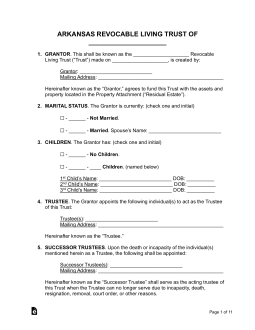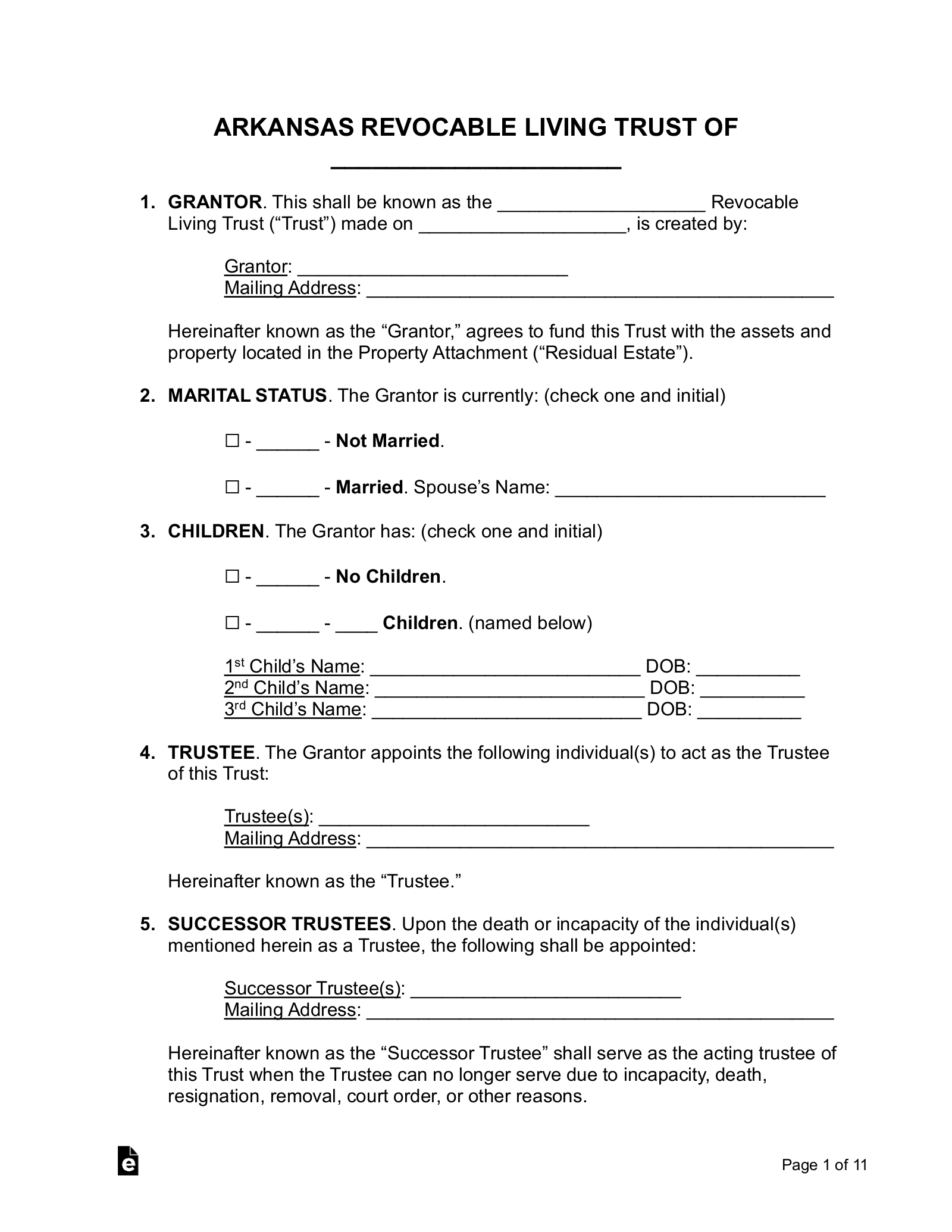Updated January 26, 2024
An Arkansas living trust is a written document that includes the terms of a grantor transferring their property into a trust for the benefit of beneficiaries. During the grantor’s lifetime, the trust will be managed by a trustee (which is commonly the same person as the grantor). The trust’s assets are transferred to the beneficiaries upon the grantor’s death.
Requirements (5)
- Mental Capacity: The grantor has the mental capacity to create a trust;
- Intention to Create: The grantor must show evidence of an intention to make a trust;
- Beneficiaries: The trust must have a beneficiary, an individual, a charity, or a pet.
- Trustee’s Duties: The trustee must have duties to perform in the trust;
- Sole Trustee Cannot be Sole Beneficiary: If there is a sole trustee, they cannot also be the sole beneficiary in a valid trust document.[1]
Registration
There is no requirement for a trustee or grantor to register a trust in Arkansas.
Laws
Amending/Revoking a Trust – A revocable trust can be revoked by its trustee or beneficiaries.[2] An irrevocable trust can be modified or terminated if its beneficiaries agree and a court concludes that it is unnecessary to achieve the trust’s material purpose.[3] Unless a trust specifically mentions that it is irrevocable, it is revocable.[4]
Bond Requirement – If a bond is required on behalf of an acting trustee, or if a court demands it, it must be obtained prior to distributing or managing the trust’s assets.[5]
Certification of Trust – Instead of giving a copy of a trust to anyone besides a beneficiary, a trustee can give a certification of trust, which includes the following information;
- A statement that the trust exists and when it was executed;
- The identity of the grantor (trust creator);
- Identity and address of the current acting trustee;
- The powers of the trustee;
- The revocability of the trust and who has the power to do so;
- The authority of co-trustees; and
- The manner of taking title to trust property.[6]
Co-Trustees – If co-trustees can’t reach a unanimous decision, then a decision may be made by a majority of the trustees.[7]
Contesting a Trust – A person has the right to contest a trust within 3 years of the grantor’s death or 90 days after the trustee sent the person a notice informing them of the trust’s existence.[8]
Costs Related to the Trust – A trustee may only charge reasonable expenses to the trust in relation to the total amount of the trust’s property.[9]
Created in Another State – If a trust was created outside Arkansas and under the respective State laws, it is considered a valid document.[10]
Creditor’s Claims – The trust’s assets are liable to creditor’s claims to the grantor during their lifetime.[11] The trust becomes irrevocable after the grantor’s death, and creditors shall have no claims against the trust’s assets.
Informing Beneficiaries – When a trustee accepts their role in a trust, the trustee must notify the beneficiaries within 60 days. In addition, if a beneficiary requests a copy of the trust document, the trustee must furnish the beneficiary with a copy.[12]
Oral Trusts – If an oral trust is created by “clear and convincing evidence,” it is considered legal.[13]
Pet Trust – A trust can be created for the care and benefit of a pet during its lifetime after a grantor’s death. If more than one pet is named, the trust ends when the last animal dies. If a court determines the value of trust property designated for the pet trust is more than the intended use, the excess will be transferred to the trustee (if still alive) or to the beneficiaries.[14]
Signing Requirements – Even though it is recommended that witnesses or a notary public sign a trust, no statutes require it.
Spendthrift Provision – A trust may or may not include a spendthrift provision that limits or offers restraint on a beneficiary’s interest. Any such language should specifically mention that it is a “spendthrift trust” or relevant wording to be applicable.[15]
Trustee’s Compensation – If compensation is not specifically outlined in the trust, an acting trustee may take a reasonable compensation for their role and duty in managing the trust.[16]
Trutee’s Duties – A trustee shall distribute and administer, in good faith, the property mentioned in a trust to its beneficiaries.[17] While the trust’s assets are under the trustee’s control, they must make reasonable steps to ensure its safeguarding and protection.[18]
Trustee’s Powers – A trustee has general authority to exercise any powers given under the trust.[19] This may include any power legal under law regarding purchasing, lending, selling, loaning, gifting, or any other specific power mentioned.[20]
Trustee’s Liability – A trustee is not liable to a beneficiary for their actions if they followed the “prudent investor rule,” as outlined under Chapter 73, Subchapter 9.[21] This includes ensuring the trust’s assets are diversified properly unless the purposes of the trust are served better without such diversification due to special circumstances.[22]


